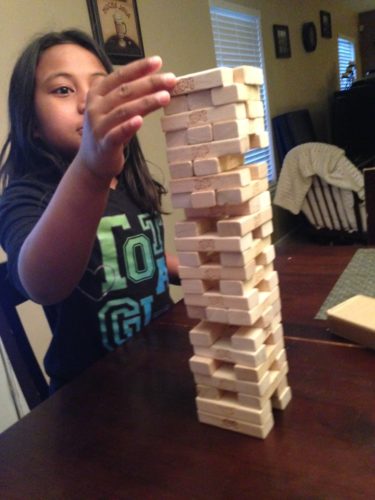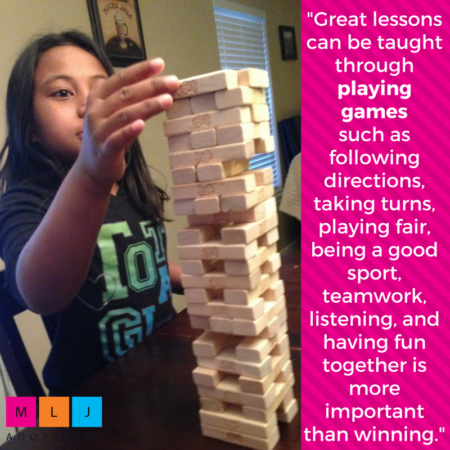 Our family enjoys playing games together! We have even dubbed Friday evenings as “Family Game Night.” It’s so beloved by my children that it does not go over well when this has to be changed, even though we play games together as a family many other days throughout the week as well. Some of our current favorite games include: One Night Ultimate Werewolf, Code Names, Apples to Apples Jr., spoons, kemps, and trash. But we also love many of the classics like: Uno, Monopoly, Life, Go-Fish, Whack-a-mole, Memory, Jenga, Chess, Mancala, Checkers, and Scrabble. Our game shelves are overflowing! We not only play board games, but we also play sports games together like basketball, baseball, kickball, hockey, soccer, and tennis.
Our family enjoys playing games together! We have even dubbed Friday evenings as “Family Game Night.” It’s so beloved by my children that it does not go over well when this has to be changed, even though we play games together as a family many other days throughout the week as well. Some of our current favorite games include: One Night Ultimate Werewolf, Code Names, Apples to Apples Jr., spoons, kemps, and trash. But we also love many of the classics like: Uno, Monopoly, Life, Go-Fish, Whack-a-mole, Memory, Jenga, Chess, Mancala, Checkers, and Scrabble. Our game shelves are overflowing! We not only play board games, but we also play sports games together like basketball, baseball, kickball, hockey, soccer, and tennis.
Our family is at a really good age for games that we as parents also enjoy, but we’ve always tried to make time to play, regardless of their age. It’s never too early to introduce your child to games. Babies love peek-a-boo or pat-a-cake! Hide and seek can be played with younger children, and it helps develop object permanence. Younger children can also play matching games, Candy Land, Chutes and Ladders, or Go-Fish.
Playing games with your children can strengthen your attachment. It shows that you care enough to take time to spend time with them doing something that THEY enjoy. Heather T. Forbes, author of Beyond Consequences, Logic and Control, recommends that parents take 10 minutes in the morning, 20 minutes after school, and 10 minutes before bedtime each day spending time intentionally and individually connecting with their children. Playing games is such a great way to spend this time connecting!
Great lessons can be taught through playing games such as following directions, taking turns, playing fair, being a good sport, teamwork, listening, and having fun together is more important than winning. It can also help to sharpen their listening, attention, and concentration skills. Another great benefit gained from playing games is building vocabulary skills. Our daughter’s tutor used the game Headbands as a means for encouraging language and vocabulary development since English is not her first language.
After adopting a child from a hard place, teaching these lessons can be difficult. Old behaviors such as lying and stealing may have been a way to survive before and are now difficult to give up. Playing games can be a fun way to practice new behaviors. But, it can be very difficult in the beginning. Many children who join their families from hard places may not be very familiar with games, especially the rules that need to be followed. Learning how to play games will take time and guidance; don’t expect that they will understand how to play correctly the first time they play. For games like Battleship or Go-Fish a referee might be needed to make sure that the rules are understood and cheating isn’t happening. Playing games should be fun so if a certain game causes too many issues, try something different.
Playing games can also be a good way to boost confidence in your child. Our daughter has a really good memory and we quickly learned that she excelled at matching games. We spent hours the first few months she was with us playing matching games together, and she frequently beat whomever she competed against. When she went to visit grandparents we would suggest that she take the game with her so they would have an activity to do together to spend time connecting. This was a great avenue for relationship building with members of our family in the beginning.
Playing games can create fun opportunities where day-to-day stressors can be alleviated to promote attachment. Games create a relaxing environment that promotes communication and encourages laughing and sharing. Some of my fondest memories are of playing games together with my family; there are so many great moments of laughter, joking, and competition. In a world that is busy and constantly on the move, it is so important to take time to intentionally connect and have fun. Quality family time spent playing games allows parents to develop a trusting relationship with their children, which is vital in parenting any child, but especially a child that joins a family through adoption.

